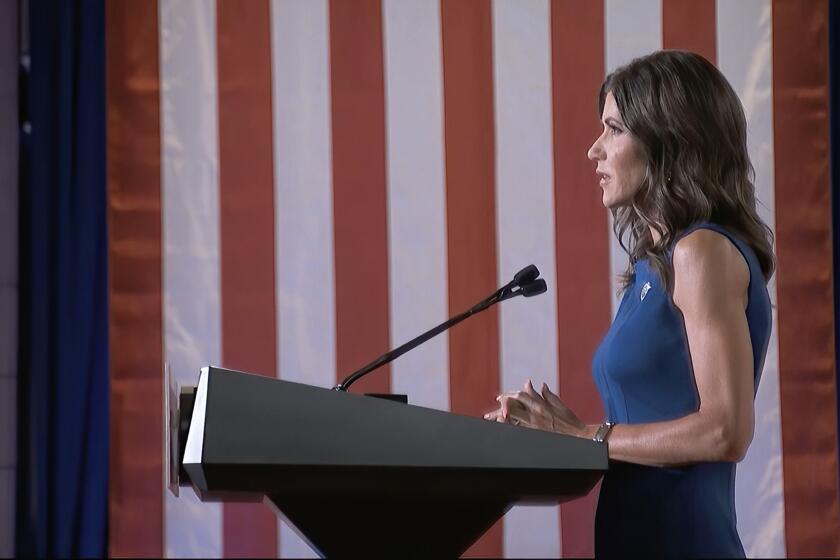Powell Presses Kenya to Hold Free Elections
Secretary of State Colin L. Powell, arriving here Saturday during a critical period in this nation’s political life, called on President Daniel Arap Moi to follow through on a pledge to end his nearly 23-year rule with free and fair elections.
Powell said the United States will be looking “with great interest” at what happens as Kenya’s electoral process unfolds next year.
“We’ll be looking for transparency. We’ll be looking to every effort on the part of the government to allow there to be full, fair and vigorous opposing views presented through the political structure that exists in Kenya,” the secretary said after meeting with Kenyan opposition leaders.
It was one of the most direct admonitions that the United States has delivered to this country, which has long-standing U.S. ties and business connections.
Powell’s message, delivered on the third stop of a four-nation African swing, has emerged as a major theme of his trip. A day earlier in South Africa, the secretary warned about the dangers of African leaders holding on to power too long and undermining the political progress needed to turn around the economies of the world’s poorest continent.
Speaking Friday at the University of Witwatersrand in Johannesburg, he all but recommended that Zimbabwe’s long-ruling president, Robert Mugabe, step down.
Like many Kenyans, the United States is increasingly concerned about the potential for more democratic slippage in yet another African country, where there are growing indications that Moi, who is 76 and has been in power since 1978, is maneuvering to run again.
The government has not yet announced a date for the presidential poll that is constitutionally mandated to be held next year, but intimidation of opposition politicians is already evident, according to U.S. officials. There also are widespread fears in both the U.S. and within Kenya’s opposition that Moi and his allies will manipulate a nationwide constitutional review and change the two-term limit on the presidency introduced in 1992.
In 1982, the National Assembly amended the constitution to formally make the country a one-party state under control of the Kenya African National Union--the only party that has ruled since independence from Britain in 1963.
That provision was repealed in 1991, limiting the president to two five-year terms. But the last election, in 1997, did not bode well because, according to international monitors, it was plagued by violence and vote-rigging.
At a meeting upon his arrival, Powell urged Moi, one of Africa’s three longest-serving leaders, to make Kenya an example for the rest of the region “of what can be accomplished when people are given a choice.”
“We look forward to the election that will be taking place for the people of Kenya to once again come forward and express their desires with respect to how they will be governed,” Powell pointedly told a joint news conference later in the day.
America’s top diplomat also pressed the government to honor Kenyan law. He said he came away from his talks with Moi “with a clear understanding and belief in the constitutional system that exists here in Kenya, which will provide for an election in 2002.”
Moi dodged a question about whether he would follow through on his pledge to surrender power, fueling further speculation among opposition politicians and the media about his intentions.
“It is too much to be always trying to undermine the intelligence of the African people,” Moi told the news conference.
“Those who will decide the destiny of Kenya, for instance, or other people in Africa, will be the people themselves. . . . I don’t know what you are worrying about,” Moi curtly told reporters.
A senior U.S. official traveling with Powell called Moi, who first assumed power after the death of modern Kenya’s founding father, Jomo Kenyatta, a “crafty politician.”
“When he took over, he was seen as a caretaker, and now he’s had 22 years as a ‘caretaker,’ ” she said.
Under Moi, the ruling KANU party has been able to use the power and resources of the state to frustrate the development of a stable multi-party system, she added.
It also has manipulated the patronage system to reinforce ethnic divisions, which are the basis of most political parties, and play off tribes against one another, the official said. That has made it difficult not only for a multi-party system to take root but also for diverse parties to come together in opposition.
Addressing economic matters, Powell said he “candidly” urged Moi to introduce more reforms so that Kenya could be eligible again for World Bank and International Monetary Fund loans, which were suspended for the second time this year after reform efforts collapsed.
“We hope that we will see in the near future anti-corruption legislation and economic crime legislation, all of which will not only allow international financial institutions to make more substantial contributions but also go a long way to encouraging further private investment,” he told the news conference.
Powell’s words have strong appeal in Kenya.
“It is important that he talks to Kenyans and reassures them that the United States is behind them in their efforts to liberate themselves from arbitrary government,” the People Daily editorialized Saturday.
After meeting with Powell, Martha Koome, head of the local chapter of the International Federation of Women Lawyers--one of the foremost human rights groups here--said she did not believe that Kenya can have a free election under the current circumstances.
“The entire process is controlled” by the leadership, she said. “The playing ground is very, very uneven.”
Warning that “anything is possible in Kenya,” she said KANU already has indicated that it intends to support Moi as its sole candidate.
At the news conference, Powell also said the United States is “anxious” to see reconciliation in neighboring Sudan, another of Africa’s troubled states, after 18 years of civil war. He announced that the Bush administration will soon appoint a special envoy to deal with issues involving Sudan.
“We want to see these peoples find a way to live in peace together in one nation in a system that they design and a system that will provide for the needs and the aspirations of all the people in Sudan,” he said.
After his visits to Mali, South Africa and Kenya, Powell will make the final stop of his trip today in Uganda before heading to Europe on Monday.
More to Read
Start your day right
Sign up for Essential California for news, features and recommendations from the L.A. Times and beyond in your inbox six days a week.
You may occasionally receive promotional content from the Los Angeles Times.






